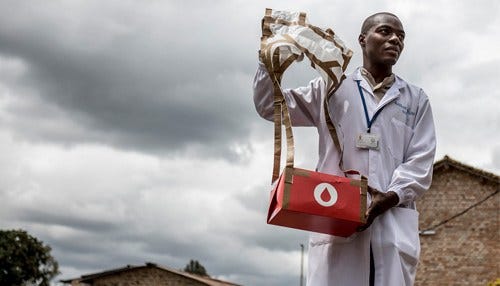Helmer Keeps Blood Drone-Ready in Africa
 Before being loaded onto the drone
Before being loaded onto the drone
Subscriber Benefit
As a subscriber you can listen to articles at work, in the car, or while you work out. Subscribe NowA lifesaving mission that delivers blood via drones is underway in Rwanda, and an Indiana company is a critical part of the operation. Silicon Valley-based robotics company Zipline launches high-tech drones into Rwanda’s sky each day, loaded with lifesaving blood for patients in remote areas. While drones make the jaw-dropping deliveries, it’s Noblesville-based Helmer Scientific that provides the high-tech equipment to store the blood at Zipline’s hub and ensure it’s ready for takeoff.
The blood is bound for rural areas where unpaved roads and rugged terrain make transportation difficult, especially during the country’s lengthy rainy season, when streets are washed out or impassable. Solving what’s called “the last-mile problem” is critical: Rwanda’s leading cause of death for pregnant women is postpartum hemorrhaging, and a blood transfusion can save lives. A second challenge is malaria, the leading cause of death in Rwanda; patients may become severely anemic and need blood.
“Zipline recognized we’re a global leader in the blood storage and processing market, and we have extensive expertise and history serving blood banks around the world,” says Helmer Scientific Director of Marketing and Business Development Ben Greenfield.
Zipline launched its Rwandan drone delivery operation in 2016 and hand-picked Helmer to stock its first distribution hub with blood bank refrigerators, plasma freezers, plasma thawers and platelet storage systems—about 15 pieces of equipment all manufactured by Hoosiers in Noblesville.
“It’s a big deal when you’re choosing your partner for blood storage and processing equipment; it’s an absolutely critical piece before the product hits the drones,” says Greenfield. “Making sure [blood products] are maintained at the right temperature and processed appropriately is a requirement for safety and regulatory purposes—and ultimately—a requirement to save lives.”
The hub is the launch site for 15 drones that deliver blood, plasma and platelets to 21 clinics throughout the western half of the country. Zipline says it’s logged about 4,000 flights, and approximately one-third of them have been emergency, lifesaving situations. Zipline will soon open a second distribution center in Rwanda in the fall to enable drone delivery for the entire country and will stock it with more Indiana-made equipment.
Conventional blood delivery by motorbike or ambulance took up to five hours—dependent on weather and road conditions—but Zipline’s drones reduce that time to 17 minutes and can fly in wind and rain. With reliance on Helmer products, Zipline says the first hub has reduced the spoilage rate of blood products in Rwanda by more than 95 percent.
“Blood therapies have very, very specific storage guidelines to ensure both safety and effectiveness of the transfusion,” says Greenfield. “If it’s not stored correctly, the patients on the other end of the drone delivery could be at direct risk.”
Zipline is using high-tech Helmer refrigerators that ensure the blood is stored according to strict regulatory requirements and stays within a very tight temperature range. The equipment will alarm if the temperature is creeping out of range, or a power failure trips the system—before the hiccups endanger the blood products.
“It’s really important that all locations within the refrigerator cabinet have tight temperature uniformity,” says Greenfield, “so it doesn’t matter where the blood is stored—on the top or bottom, the back or the front—it’s the same precise temperature throughout the cabinet.”
Helmer, which has healthcare clients in more than 130 countries, is hopeful the Rwanda operation will be a springboard for more business with Zipline. This spring, Zipline unveiled what it calls “the fastest commercial delivery drone on earth” and plans to “scale to meet the needs of countries around the
world—including the United States.” With work already underway to serve additional African countries, the company is expanding drone delivery of lifesaving medications like snake antivenom, vaccines and antimalarials.
“There’s definitely a sense of pride about supporting Zipline,” says Greenfield. “One of the nice things about working for Helmer is we have great pride in providing products around the world that clinicians use to save lives.”
And as more drones take flight in Africa and around the world, it’s likely storage and processing needs will climb equally high, and Helmer is poised to ensure the delicate products are drone-ready.
Greenfield says Helmer refrigerators and freezers have special features to meet the demands of a blood bank.
Greenfield says Helmer’s manufacturing facility in Noblesville is state-of-the-art and quality-certified for medical devices.
